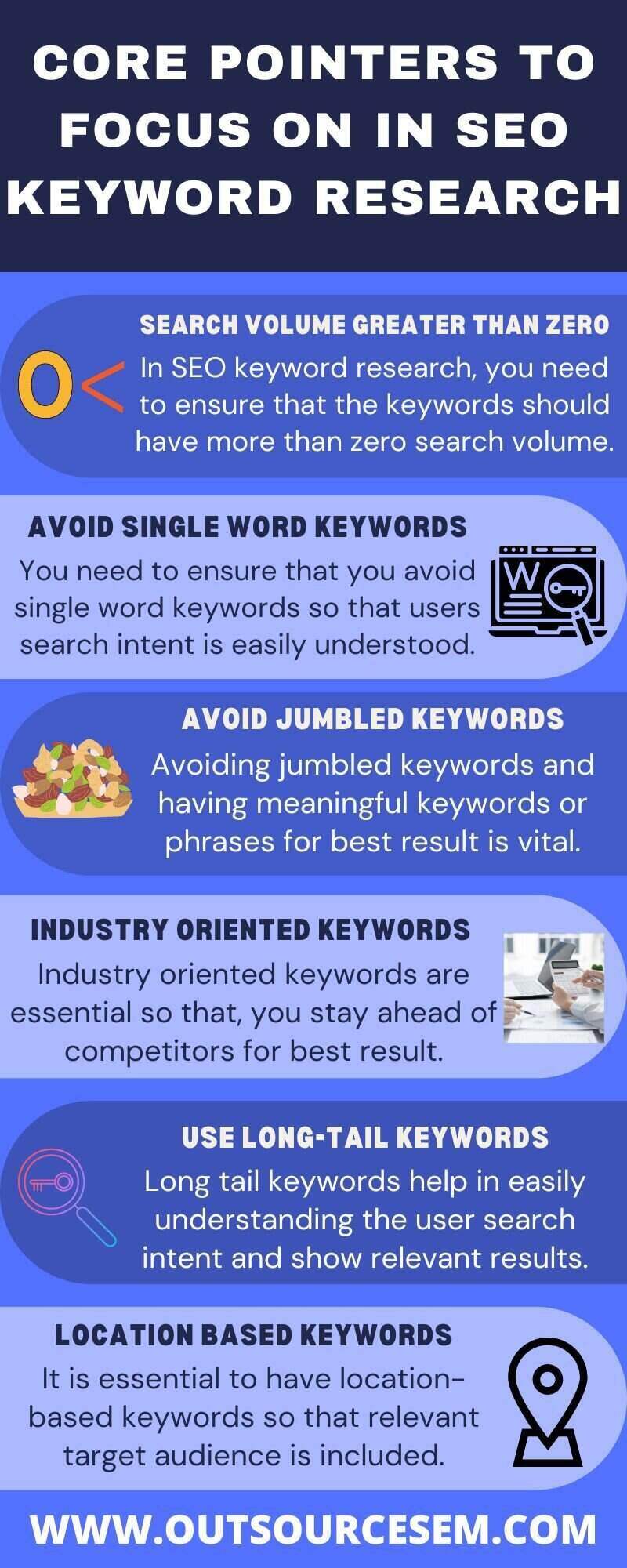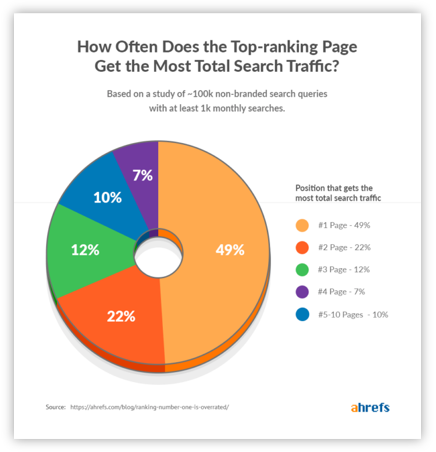68% of online activities begin with search queries in search engines like Google or Bing. Search engines use multiple ranking factors to rank websites for the keywords or search terms users enter. To stand out from the crowd and rank your website higher on the SERPs, keyword research is one of the core essentials that online marketers need to concentrate on. You need to know the relevant keywords that should be used for optimizing the website, updating the page content, link building, etc. In this blog, we will discuss the importance of keyword research in SEO and walk you through how choosing the relevant keywords would help you increase website traffic, achieve website conversion goals, etc. To learn more about SEO, you can hone in on our blog for an amazing guide to search engine optimization.
Core pointers to focus on in SEO keyword research

1. Search volume should be greater than zero - The search volume of the selected keywords needs to be greater than zero. It is essential to include the keywords in the keyword list so that you can segregate the relevant keywords to be used in the page content. Some keywords have zero search volume and also yield the desired marketing goals. However, these zero search volume keywords need to be handled with a proper plan & strategy to help achieve the desired goals.
As in PPC ads, you concentrate on choosing the keywords with a better search volume to make your ads visible to a wide audience. In the same way, you need to focus on choosing the relevant keywords for your business and ensure that they have a search volume greater than zero. In a PPC ad campaign, you focus on keyword bidding so that the target audience sees your ad for the keywords or search terms entered. The PPC ad campaigns include keywords that can be divided into three categories: exact match keywords, phrase match keywords, and broad match keywords. It helps to have a clear idea of which keywords need to be included in which ad group so that the relevant users can see the ads. You also add negative keywords in the PPC ad campaign so that your ads do not appear to irrelevant clicks.
Search engine optimization includes a wide range of keywords compared to PPC ads, so avoiding keywords that may not be necessary for the business becomes critical. In PPC ads, you have to pay the search engines for every click received on the ad, which is not the case with SEO campaigns. Avoiding zero search volume keywords is essential as users rarely enter these keywords. So, including these keywords in the list is not a good idea.
2. Avoid single word keywords - Since the launch of search engines, there have been many algorithmic changes to rank websites on the SERPs. When doing keyword research in SEO, one of the vital points you need to concentrate on is avoiding single-term keywords. The user may enter the single-term keywords for a specific search query relevant to the products or services they are looking for. So, when large keyphrases with at least two or more terms are used, the search engines can determine the results to be shown to users.
With Google’s many ranking factors used to show the website for the users' search query, one of them is the keywords. You need to ensure that you avoid single-term keywords so that the search engines or online platforms quickly realize what the users are searching for to display the relevant results. Having keywords more than a single term gives clarity to understanding the desired result to be displayed is easy.
When running PPC ads, you use keywords matching the users' search query so that the best target audience reaches the landing page. When you have prepared a keyword list for the website content, you can determine which keywords need to be kept and which to exclude. With the help of an SEO audit, you see the performance of the SEO metrics and then work on the optimization process to improve the web presence, like updating old content, targeting primary and secondary keywords, optimizing page titles, eye-catching meta descriptions, a mix of internal link and external links. In all these, you focus on avoiding single-term keywords and try to optimize the SEO parameters with the selected keywords.
3. Avoid jumbled keywords - Another essential point to focus on in SEO keyword research is avoiding jumbled keywords. In your SEO keyword research process, you need to focus on choosing the keywords that make sense and are understood by the search engines.
Be it Google’s algorithm, Bing's algorithm, etc., all online platforms have their methods to realize the keywords or search terms entered. The more sensible the keywords are to the search engines, the better the chances of ranking the website. As you work on SEO pagination, the server load is reduced in determining which page is to be displayed to the target audience. For a larger website, organizing the page content is even more vital so that the user can easily navigate through different website sections.
4. Industry oriented keywords (keywords relevant to your business) - The next essential point that you need to focus on is using industry-oriented keywords. By meaning, industry-oriented here means those keywords that are relevant to your business. Although it is a well-known fact that no website owner would have SEO campaigns that have keywords not relevant to their business, there are chances that they will miss out on the essential keywords.
To ensure that the relevant keywords related to your business are not missed, you can conduct an SEO audit to determine which keywords competitors use. When you have an idea of competitors' keywords, you can consider using them in your keyword list. With the help of a keyword research tool, the search volume of these competitive keywords can be determined. With our white label PPC services, we offer complete PPC solutions to clients globally. If you find conducting an SEO audit a tough task to perform, you can outsource SEO audit services to us. With the help of an SEO audit, you can not only know many other key parameters like whether the site is indexed or not, work on improving user experience, check whether the pages are crawlable & indexable, etc.
5. Use long-tail keywords - In the SEO keyword research process, the next point that you need to ensure is that you use long-tail keywords. Long-tail keywords are essential to be targeted as many times users tend to describe their needs for looking for products or services that your business offers. In today’s online marketing world, it is critical to understand better what the users are looking for. This can be determined best when you target long-tail keywords in your SEO campaigns.
As in a PPC ad campaign, you focus on writing ad texts and ad description that meets the users' search query. It helps to improve your ad position & ad rank on the SERPs. Similarly, when you target long-tail keywords, you provide leverage to your SEO campaigns to target users that have a high chance of taking the desired action.
Long-tail keywords are a great SEO tactic as it includes longer terms that are commonly used. Usually, these keywords have less search traffic but a higher conversion rate. These are more specific keywords and help increase your website visibility. When your website visibility increases, the impression share of your website increases, and you experience increased website traffic on the webpage. You also need to ensure that you have a good page loading speed, well-optimized images, image alt text, etc.
The e-commerce industry has a wide range of products, so no users would wish to lose their website traffic. With e-commerce SEO, it becomes even essential to target long-tail keywords so that the users get to see your website for the products. With long-tail keywords, finding your audience is easier, and it helps in niche marketing. With social media marketing, when running Facebook Ads, LinkedIn Ads, YouTube Ads, Instagram Ads, etc., you not only target the relevant audience, but when the users are satisfied they promote your brand name to their near & dear ones. As in affiliate marketing, you describe the product or service descriptions so that the other users reach the webpage using your suggestion or link. Similarly, when users are satisfied with the products or services being offered, they help in peer-to-peer marketing.

6. Location based keywords/location targeting - The next essential point to focus on in SEO keyword research is choosing the keywords based on location. Some keywords perform better in comparison to a different location. When you have a list of keywords that are chosen based on the location, the chances of the relevant target audience reaching the web page increase.
You can determine the keywords based on location with the keyword research tool. It also helps to study the audience behavior and determine the relevant keywords based on the user behavior. You can focus on user search intent and then have an idea of the keywords they can search for or the search terms entered.
Local keywords are essential to be used as they contain location-specific keywords or phrases. These are vital to be used as they target specific users to a particular geographic location. For businesses that provide services locally, like plumbing, HVAC, electricity, etc., targeting the relevant users in the specific region becomes essential. As in a PPC ad campaign, you focus on running local service ads to target users locally and write ad copies accordingly. Similarly, it is essential to focus on local SEO and write meta descriptions, headers, etc., that entice the users to click and create a sense of urgency among the users to convert.

Why is SEO keyword research important?
a. Increases website ranking - The essential reason why SEO keyword research is necessary is that it increases website ranking on the SERPs. With the use of relevant high-traffic keywords on the page, you can see an increased website ranking on the SERPs. With such a wide number of websites, it becomes crucial to work on optimization strategies that help deliver the desired results. To understand how often the top ranking page get the most total search traffic can be understood by the image below.

When you have a higher website ranking on the SERPs, then more users see your website. This ultimately leads to increasing traffic. Some of the points that you can concentrate on to increase website traffic are listed below:
i. Understanding online users.
ii. Updating old content on the page.
iii. Optimizing website for mobile devices.
iv. Focus on link building.
v. Increase the number of backlinks.

b. Drives relevant traffic to the webpage - With the help of a free keyword research tool, you can determine which keywords to be used in the SEO campaign. Once you have prepared a list of target keywords that you wish to optimize your page content with, it helps improve the performance of many essential SEO metrics. The more relevant keywords that you have on your website, the better the chances of the users clicking on the website. This helps to increase website traffic.
Be it email marketing, content marketing, search engine marketing, etc., focusing on lead generation helps achieve the desired marketing goals. Many other essential SEO parameters need to be dwelled upon, like building brand awareness, increasing visitors' time on the page, maximizing page speed, etc. This would help lower the website traffic so that the users reaching the webpage get converted.
.jpg)
c. Choose keywords based on user search intent - Another essential importance of SEO keyword research is choosing keywords for your SEO campaigns based on the users' search intent. You can analyze the user behavior and perform an SEO audit to see what the users enter in the search bar when looking for your products or services.
Once you know about the user search intent, you can focus on user-generated content that grabs the users' attention into making a click on the ad. You can concentrate on touching the unique selling points of the users so that you can determine which user pain points you need to touch to increase online sales.
d. Relevant keyword help formulate content strategy - When you have a set of desired keywords, you can use these keywords to write enticing content on the page. This would help in enhancing the user experience. A proper content marketing strategy can then be formulated to write industry-oriented content. Be it any form of marketing, content plays a crucial role, and thus, there is a saying staging “Content is king”.
.jpg)
e. Marketing trends insight - Keyword research is essential as it helps to gain marketing trend insight. With online marketing being different from traditional marketing, many marketing trends keep evolving. With the help of a keyword research tool, you can determine which keywords need to be optimized in sync with the marketing insight. When these keywords are used properly, your website does not lack behind compared to competitors. To know more about the importance of marketing trends, you can read our blogs on PPC trends, SEO trends, and e-commerce trends.
f. Boosts customer acquisition - SEO keyword research is vital as it helps to boost customer acquisition. In the online marketing world, where there are constant changes, it is crucial to focus on customer acquisition so that the users do not choose other websites for the keywords or search terms entered. Using proper keywords, you can work on customer acquisition and plan strategies to retain the users already associated with your business in the long run.

Why do keyword research on a regular basis?
• Changing keywords - Doing keyword research is essential as there is dynamism in the online marketing world. The more dynamism in the marketing trends, the higher the need to look for the keywords that the users are looking for. So, choosing and including these keywords in the page content becomes essential.
• Changes in search engine algorithm - The changes in marketing trends are monitored closely by search engines. To ensure that the users' trust in the search engines is maintained, the search engines keep upgrading their ranking algorithm to show the best search results to the users.
• Updating the content - The next essential point that keyword research helps with is updating the content regularly. Content marketing has always been and will continue to be in demand. It is because the content is used to convey the brand message to the target audience. Conducting keyword research regularly helps to optimize the relevant keywords on the page so that it brings the desired results. You can outsource SEO keyword research services and see how the content specialists update the content and help in achieving the desired website goals.
Keyword research tool
Keyword research is one of the critical elements of search engine optimization. To do so, a keyword research tool must be used to provide the best keywords for the business. There are some essential keyword research tools that can help SEO marketers to achieve the relevant keywords for your business.
1. Google keyword planner tool - You can use the keyword planner tool by Google to conduct SEO keyword research. The Google keyword planner tool provides you with the essential keywords that are relevant to your business. With the help of this, you can have the relevant keywords and have real-time keyword performance by analyzing the different keywords parameter. This keyword tool is quite vital as it is free and provides quality keyword suggestions directly from Google.
2. Ahrefs - Another keyword research tool that you can use is Ahref. It is a keyword research tool that provides you with all the details on the keywords. When you enter the keywords in the Ahref tool, you can see which keywords are best for your website.
With such a wide range of keywords, you can choose the desired keywords based on search volume, relevancy, etc. The Ahref tool helps to choose the relevant ranking keywords. You can then download these keywords and prepare a list of which to include and which to exclude.
3. Semrush - With the help of the Semrush keyword research tool, you can determine the relevant keywords for your business. The Semrush keyword planner tool helps to easily findly the relevant keywords for your business. You can determine the keywords from Semrush in the following ways.
a. Using the seed keywords - One of the ways to find the relevant keywords for your business is using the seed keywords. You can enter the seed keywords related to your business to find other business ideas related to your business.
The seed keywords are the keywords that you use to get more business keywords. The more relevant the keywords are to your business, the higher the chances of the user clicking on your website for the products or services they seek. With the seed keywords, you can analyze whether to use short-tail keywords or long-tail keywords. You must ensure the keywords you use have the desired search volume.
b. Using the website URL - Another way to find the relevant keywords for your business is using the website URL. You can add the URL to search for the keywords and then get relevant keyword ideas related to your business. With such a wider range of keywords that the users target, you would have a detailed keyword list that you can analyze to choose the relevant keywords for your business.
As in pay-per-click advertising, you focus on choosing the relevant competitor keywords to have a complete idea of which keywords you need to include in your PPC keyword research process for audience targeting. In the same way, with the SEO keyword tool, you need to target the relevant keywords and then prepare a keyword list that drives the best results.
4. Moz - One of the best keyword research tools for your SEO campaigns is Moz. It gives you keyword suggestions that are relevant to your business, and you can decide whether to use these keywords in the page content. With the help of Moz, you can get the relevant keywords for your website. Moz keyword research tool can provide you with the following points:
a. Generate relevant keyword suggestions - With the help of Moz's free keyword research tool, you can discover keywords and topics relevant to your business. You can sort the keywords based on search volume, monthly search volume, etc. It helps to choose the relevant keywords based on Moz’s relevancy metric. As in a PPC ad campaign, you choose the keywords that help you to target the relevant audience. Similarly, with the Moz keyword planner tool, you can focus on audience targeting based on keyword suggestions. You can then export these keywords to CSV files and can also add them directly to your Moz campaigns and keyword lists.
b. Analyze the SERP for a given keyword - The SERP analysis helps you to understand the keyword performance. It helps you get an idea of who ranks for the keyword. SERP previews include Moz domain authority, page authority, and the number of backlinks for each organic result.
As in a pay-per-click ad campaign, you bid on keywords that help in better ad rank & position; similarly, you need to analyze the SERP performance of a given keyword. A high score on the Moz keyword indicates that the page’s content, metadata, internal linking, and other technical SEO features are performing well, enhancing the keyword's organic visibility.
Conclusion
Search engine optimization is an ongoing process, so optimize the website regularly in sync with the latest marketing trends. So, it becomes essential to check and optimize keywords regularly. It ensures that your SEO campaigns do not miss out on any target keywords and helps your website be ahead of the competitors. You can use the best keyword research tool discussed in the blog to conduct SEO keyword research. Free keyword research tools also provide you with many keyword analysis reports like keyword difficulty, search volume, etc. In the keyword research process, you just need to stay on top of your research process so that none of the relevant keywords are left aside. For intensive keyword research, you can outsource SEO keyword research service to a digital marketing company and earn a great business return from your website. Utilizing powerful keyword research tools allows you to pinpoint and focus on relevant keywords across various industries for availing services like electricians SEO, flooring SEO, roofing SEO, lawyers SEO, and small business SEO. All these services will eventually lead to increase in website traffic and growth on a long term basis.
References:
• How to do keyword research with examples and tips
• How to do keyword research for SEO (a detailed 3-step guide)
